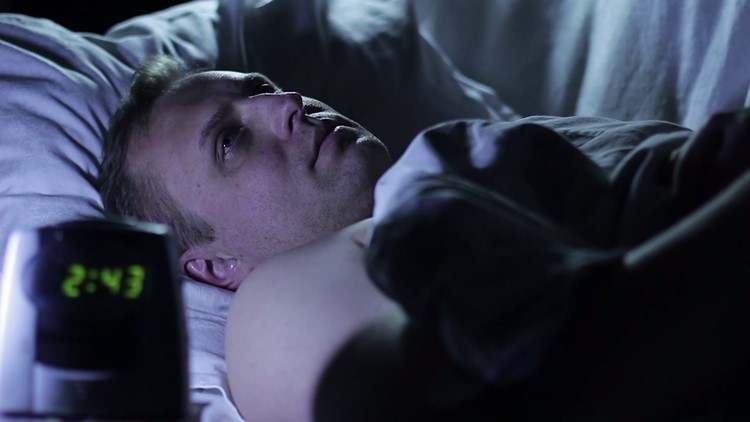If you have trouble sleeping, chances are you've dabbled in using melatonin – and chances are, you probably aren't using it correctly.
The over-the-counter supplement appears to be the new "it" sleep product. Browsing the shelves at a drug store will likely bring you face-to-face with swaths of purple-colored bottles, each containing doses of melatonin in pill, tablet or liquid form.
There's even highly-advertised and trendy vape products that allow you to puff the stuff.
But here's the rub: melatonin is not a magic sleeping pill, experts say. It's actually a hormone that your body naturally produces at nighttime, and regularly ingesting an extra synthetic dose of it may be doing more harm to your body than good.
According to MayoClinic, "the production and release of melatonin in the brain is connected to time of day, increasing when it's dark and decreasing when it's light." Therefore, people with normal sleep schedules and an overall steady ability to fall asleep should not need an extra melatonin boost – their bodies are already taking care of that hormone's production.
Even individuals with uncommon or problematic sleep habits still may not benefit from a melatonin supplement. MayoClinic notes there is no clear research that melatonin helps people with insomnia and shift work disorder.
However, individuals working through jet lag or who have delayed sleep-wake phase sleep disorder may experience some positive symptom relief using it.
More people, larger doses
That's why melatonin is often only recommended to limited, particular groups of people – and in small doses. However, more and more average adults are taking it in larger doses.
A new study released Feb. 1 from the Journal of the American Medical Association (JAMA) reported melatonin usage among American adults "significantly increased" between 1999 and 2018. Researchers found participants in the study actually more than doubled their melatonin consumption compared to a decade earlier.
Plus, although researchers noted the prevalence "remained very low," they found an increase in adults reporting they take more than five milligrams of melatonin, which is often considered the highest dose that is safe for adults to take. This finding in particular "may raise safety concerns."
That's because melatonin is considered a dietary supplement and is therefore regulated "less strictly" by the U.S. Food and Drug Administration. Thus, companies are not federally required to test their supplements to ensure it matches up to the labeled dosage.
Researchers with the JAMA study noted that "the actual content of melatonin in marketed supplements may be up to 478% higher than the labeled content." That's a concern because too much melatonin can worsen the problems that individuals wanted to resolve by taking it.
According to Healthline, overuse of melatonin "can make it harder to sleep because your normal circadian rhythms will be disrupted" and can result in anxiety, dizziness, headaches and nausea, among other side effects.
Not to mention the JAMA researchers concurred with MayoClinic's assessment of the supplement, saying there is "weak" existing evidence to support melatonin as a remedy for sleep difficulties.
Current melatonin recommendations
Although melatonin may seem benign, most medical experts encourage a natural hormone production route. A.K.A., trust your body and let it do it's thing.
However, if you struggle with specific sleep-related issues, you can try it, but only in a short-term fashion. As the National Center for Complementary and Integrative Health notes, "information on the long-term safety of supplementing with melatonin is lacking."
Consider this advice from MayoClinic:
"Your body likely produces enough melatonin for its general needs. However, evidence suggests that melatonin supplements promote sleep and are safe for short-term use. Melatonin can be used to treat delayed sleep phase and circadian rhythm sleep disorders in the blind and provide some insomnia relief. Treat melatonin as you would any sleeping pill and use it under your doctor's supervision."
Plus, doctors advise taking melatonin at a much lower dosage than most commercial melatonin products offer.
Johns Hopkins Medicine advises using the sleep supplements "wisely and safely," only taking one to three milligrams two hours before your desired bedtime. Still, Johns Hopkins experts also recommend simply practicing healthy bedtime habits and re-setting sleep schedules naturally.
Sleeping better without melatonin
If you have trouble sleeping, many medical experts will likely recommend you look for relief without the aid of a supplement.
Johns Hopkins Medicine encourages dimming lights a couple hours before bedtime to prepare the mind for rest and encourage natural melatonin production. Even though its also highly recommended you stay off screens before sleeping, use filters to screen out blue and green light if you have to work on your phone or computer at night.
Medical News Today also suggests avoiding napping, exercising during the day, changing the temperature of your bedroom or trying breathing exercises, among other natural sleep recommendations.



